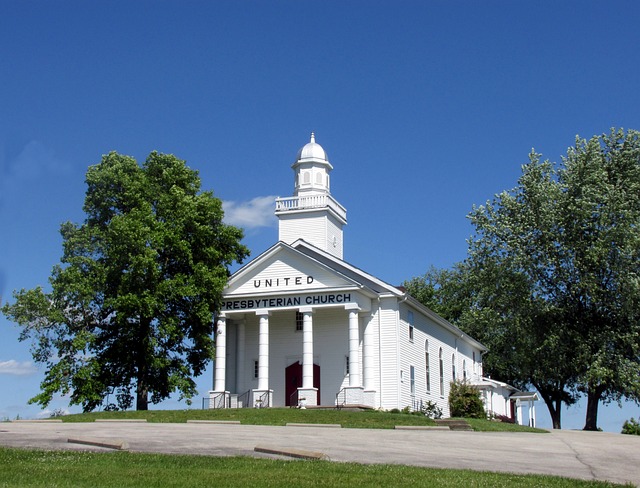Presbyterians view salvation as a gift from God, received through faith in Jesus Christ. They believe in the concept of justification by grace alone, through faith alone, and emphasize the importance of God’s sovereignty in the process of salvation.
Table of Contents
The Role of Faith in Presbyterian Views on Salvation
How do Presbyterians view salvation? This is a question that many people may have, especially if they are unfamiliar with the beliefs and practices of the Presbyterian Church. In this article, we will explore the role of faith in Presbyterian views on salvation.
For Presbyterians, faith plays a central role in their understanding of salvation. They believe that salvation is a gift from God, and it is through faith that individuals can receive this gift. Faith, in the Presbyterian tradition, is not just a mental assent to certain beliefs, but a deep trust and reliance on God.
Presbyterians believe that faith is a response to God’s grace. They believe that God’s grace is freely given to all people, and it is through faith that individuals can accept and receive this grace. This means that salvation is not something that can be earned or achieved through good works or personal merit. Instead, it is a gift that is received through faith.
In Presbyterian theology, faith is seen as a transformative experience. It is through faith that individuals are united with Christ and become part of the body of believers. This means that faith is not just a private matter, but something that is lived out in community. Presbyterians believe that faith is nurtured and strengthened through participation in the life of the church, including worship, prayer, and fellowship with other believers.
Presbyterians also believe that faith is an ongoing journey. It is not a one-time event, but a lifelong process of growth and maturation. They believe that faith is not static, but dynamic, and it is through the work of the Holy Spirit that individuals are continually being transformed into the image of Christ.
In Presbyterian theology, faith is not just about personal salvation, but also about the transformation of the world. Presbyterians believe that faith should lead to action, and they are committed to social justice and the pursuit of peace. They believe that faith should be lived out in the world, and that Christians have a responsibility to work for the common good and to seek justice for all people.
In conclusion, faith plays a central role in Presbyterian views on salvation. Presbyterians believe that salvation is a gift from God, received through faith. They see faith as a transformative experience, a response to God’s grace, and a lifelong journey of growth and maturation. Faith is not just a private matter, but something that is lived out in community and expressed through action. Presbyterians believe that faith should lead to a commitment to social justice and the pursuit of peace. So, if you’re wondering how Presbyterians view salvation, it all comes down to faith – a deep trust and reliance on God’s grace.
Understanding Predestination in Presbyterian Theology of Salvation

How do Presbyterians view salvation? To understand this, we need to delve into the concept of predestination in Presbyterian theology. Now, don’t let the word “predestination” scare you off. It’s not as complicated as it sounds, and it’s actually a central belief in Presbyterianism.
So, what exactly is predestination? Well, in simple terms, it means that God has already determined who will be saved and who will not. This belief stems from the idea that God is all-knowing and all-powerful, and therefore, He has complete control over our salvation. It’s like He has a master plan, and we are all part of it.
Now, you might be wondering, how does this fit with the idea of free will? After all, if God has already decided our fate, do we really have a choice in the matter? This is where things get a bit nuanced. Presbyterians believe in what is called “compatibilism,” which means that God’s sovereignty and human free will can coexist.
In other words, while God has already determined who will be saved, He also works through our choices and actions to bring about His plan. It’s like a dance between God’s will and our own. We make choices, but ultimately, God is the one guiding us towards salvation.
Now, you might be thinking, “But what about those who are not predestined to be saved? Does that mean they have no hope?” Not at all. Presbyterians believe in what is called “common grace.” This means that God extends His grace to all people, regardless of whether they are predestined for salvation or not.
Common grace is like a gift that God gives to everyone. It’s His way of showing His love and mercy to all of humanity. So, even if someone is not predestined for salvation, they can still experience God’s grace in their lives. It might not lead to eternal salvation, but it can bring blessings and goodness into their lives here on earth.
Now, you might be wondering, how does one know if they are predestined for salvation? Well, that’s a tough question. Presbyterians believe that only God knows who is predestined for salvation. It’s not something that we can figure out on our own. Our job is to have faith in God and trust in His plan.
This belief in predestination and common grace shapes the way Presbyterians view salvation. It’s not about earning our way into heaven or trying to be “good enough.” Instead, it’s about recognizing that our salvation is ultimately in God’s hands. We can’t control it or manipulate it. All we can do is trust in God’s love and grace.
So, if you’re a Presbyterian or curious about Presbyterianism, remember that salvation is not something to be feared or worried about. It’s a gift from God, and He has a plan for each and every one of us. Trust in His love, have faith in His grace, and let go of the need to control your own destiny. After all, God’s got it all figured out.
The Importance of Grace in Presbyterian Perspectives on Salvation
How do Presbyterians view salvation? This is a question that many people may have, especially if they are unfamiliar with the beliefs and practices of the Presbyterian Church. In order to understand how Presbyterians view salvation, it is important to first understand the role of grace in their perspective.
Grace is a central concept in Presbyterian theology and plays a crucial role in their understanding of salvation. Presbyterians believe that salvation is a gift from God, given freely through his grace. This means that salvation cannot be earned or achieved through good works or personal merit. Instead, it is a result of God’s unmerited favor and love for humanity.
This emphasis on grace is rooted in the teachings of John Calvin, a prominent figure in the Protestant Reformation and one of the key theologians of the Presbyterian tradition. Calvin believed that humans are inherently sinful and incapable of saving themselves. Instead, salvation is solely dependent on God’s grace and mercy.
Presbyterians believe that God’s grace is made manifest through Jesus Christ, who is seen as the ultimate expression of God’s love and forgiveness. Through his life, death, and resurrection, Jesus offers salvation to all who believe in him. This belief in the redemptive power of Christ’s sacrifice is central to Presbyterian theology.
However, Presbyterians also believe that faith is necessary for salvation. While they affirm that salvation is a gift from God, they also emphasize the importance of personal response and acceptance of this gift. Faith is seen as the means by which individuals receive and appropriate God’s grace in their lives.
Presbyterians believe that faith is not simply a mental assent to certain doctrines or beliefs, but an active trust and reliance on God. It involves surrendering one’s life to Christ and seeking to live in obedience to his teachings. This understanding of faith is closely tied to the concept of discipleship, which is seen as an ongoing process of growth and transformation in the Christian life.
In Presbyterian theology, salvation is not a one-time event but a lifelong journey. It is a process of sanctification, in which believers are continually being conformed to the image of Christ. This process involves both the work of the Holy Spirit and the active participation of the individual.
Presbyterians believe that salvation is not limited to a select few, but is available to all who put their faith in Christ. They reject the idea of predestination, which suggests that God has predetermined who will be saved and who will be damned. Instead, they affirm the universal offer of salvation and the responsibility of individuals to respond to God’s grace.
In conclusion, Presbyterians view salvation as a gift from God, given freely through his grace. They believe that salvation is made possible through the redemptive work of Jesus Christ and is received through faith. This emphasis on grace and faith distinguishes Presbyterian theology from other Christian traditions. Ultimately, Presbyterians believe that salvation is a lifelong journey of growth and transformation, made possible by God’s unmerited favor and love.
Exploring the Sacraments in Presbyterian Beliefs about Salvation
How do Presbyterians view salvation? To understand this, we need to explore the sacraments in Presbyterian beliefs about salvation. The sacraments play a significant role in the Presbyterian faith, and they are seen as a means of grace through which believers receive God’s saving power.
In the Presbyterian tradition, there are two sacraments: baptism and the Lord’s Supper. Both of these sacraments are considered essential for salvation, but they are understood in different ways.
Baptism is seen as a sign and seal of God’s covenant with His people. It is a visible representation of the believer’s union with Christ and their participation in His death and resurrection. Through baptism, Presbyterians believe that individuals are initiated into the community of faith and receive the forgiveness of sins.
However, Presbyterians do not believe that baptism alone guarantees salvation. They emphasize the importance of faith and the ongoing work of the Holy Spirit in the believer’s life. Baptism is seen as a visible expression of the inward reality of faith, but it is not the source of salvation itself.
The Lord’s Supper, also known as communion, is another sacrament that holds a central place in Presbyterian worship. It is a commemoration of Christ’s sacrifice on the cross and a means of grace through which believers receive spiritual nourishment.
In the Presbyterian understanding, the bread and wine used in communion are not literally transformed into the body and blood of Christ. Instead, they are seen as symbols that point to the reality of Christ’s presence. Through the act of partaking in the Lord’s Supper, believers are reminded of their union with Christ and are strengthened in their faith.
Presbyterians believe that the sacraments are not just empty rituals but are channels through which God’s grace is communicated to His people. They view the sacraments as visible signs of God’s invisible work in the believer’s life, confirming and strengthening their faith.
While the sacraments are important in Presbyterian beliefs about salvation, they are not the only means through which individuals can experience God’s saving grace. Presbyterians also emphasize the importance of Scripture, prayer, and the preaching of the Word in the believer’s journey of faith.
Salvation, in the Presbyterian understanding, is a lifelong process. It begins with God’s grace, which is freely offered to all, and is received through faith. This faith is not a one-time event but a continuous response to God’s love and grace.
Presbyterians believe that salvation is not earned through good works or personal merit but is a gift from God. It is through faith in Christ and His redemptive work that individuals are reconciled to God and receive the assurance of eternal life.
In conclusion, Presbyterians view salvation as a journey that involves the sacraments, faith, and the ongoing work of the Holy Spirit. Baptism and the Lord’s Supper are seen as visible signs of God’s saving grace, but they are not the source of salvation itself. Salvation is a gift from God, received through faith in Christ, and is a lifelong process of growing in relationship with Him.
Conclusion
Presbyterians view salvation as a gift from God, received through faith in Jesus Christ alone. They believe in the doctrine of justification by grace through faith, emphasizing the importance of God’s grace in the process of salvation. Presbyterians also emphasize the role of the Holy Spirit in the believer’s life, guiding and transforming them to live a life that reflects their faith. Overall, Presbyterians believe that salvation is a result of God’s initiative and grace, and it is through faith in Jesus Christ that individuals can experience salvation.


